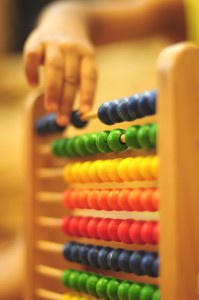“How do I know if my kid is on grade level?”
We all want to make sure our kid is working at a reasonable level, and that we are not short changing them compared to their public school peers. No one wants to be the parent who happily sends their kid off to college, thinking we did a great job, only to find out they are failing because they are ill equipped.
While all these feelings are normal, I want to express that the public school system should not be our only measuring stick; we can aim for more lofty goals. That doesn’t mean our kid will necessarily memorize more country capitals, or have three years of calculus under their belt. There are more important things to worry about when it comes to educating our children.
Think about what is the real goal of education. The end goal is to prepare our children to be capable adults – able to handle day to day responsibilities with a good work ethic and common sense. Can these goals be achieved, even if they aren’t “on grade level” for math in third grade? I’m pretty certain you can still get to the end goal by the time they hit adulthood.
With that said, how can we calm our mind, and the voices of the naysayers in our lives?
 Math
Math
Math curriculum is typically marketed by a grade level, or the system they use (i.e. colors – red level, green level) is easily tagged to the typical grade level on their website. Choose a math curriculum that will fit the learning style of your child and stick with it as best you can because moving from one curriculum provider to another usually has both overlap and gaps in math concepts. Math is one of the easiest subjects to track, and has a multitude of resources available for struggling children.
While I don’t think we should stress ourselves about being at grade level as a general principle, math is a building block for life and if a child is years behind their peers, I do think special attention needs to be given to get them to at least a functional level.
Reading
The leveled reader books usually have an age range noted on them, or on the website selling them. There are many schools of thought regarding how to teach reading, how rigorous it should be, if you should use phonics vs. sight words, etc. I don’t have the end all answer in how to get your child to a good reading level, but I do know it needs to remain fun and engaging. When Care Bear was in first grade (in public school), I wanted to encourage her to read more challenging books. I got her the Lemony Snicket’s Series of Unfortunate Events book after she already liked the movie. I would read two pages and she would read one. She liked finding more details in the books, and it was something we did together. By the second book, she was reading it on her own and loving it!
Reading is another building block that deserves time and attention, though I think many parents worry far too early about their child’s reading level. Somewhere between Kindergarten and second grade, reading usually just clicks for many kids. Just keep reading together and encouraging your child. If there are red flags that might point to a learning disability, assess them, but don’t let the “mom worry” take over.
Language Arts
Language Arts can include reading as well, but the rest of it typically consists of grammer, usage, writing, etc. Again, most publishers will label a language arts book with a typical grade level and you just continue with the program in the order it is presented.
Reading good books will get kids used to hearing proper grammar, and knowing how to use it. Grammar is a subject that is very hard to “unschool” or just explore with. I’m not sure how many kids will pick up the difference between affect and effect without being told. Given this, I highly recommend finding a grammar program that you like and sticking with it as best you can.
Social Studies and Science
Remember there is no set plan given by the Department of Education for science and social studies. There is the classical plan where you go through the time periods in chronological order in four year cycles, repeating the cycle three times over the course of your child’s education. There’s also the plan some parents use where you focus on holidays and special events to guide a social studies curriculum. This works well in the younger years, though in high school it should be more focused curriculum.
Science in the younger years can take any number of forms based on a set plan, or based on experiences and interest. Science is about discovery and finding conclusions to problems or questions. It isn’t about whether a third grader can name all the different types of clouds. Science is where the child can really open their curiosities, and should.
Next week I’ll talk about how to start homeschooling with an older child and finding the right level, in sha Allah.
The rest of the series to check out!
- Q&A: Homeschool Scheduling (February 20, 2013)
- Q&A: Homeschool Time Management (March 7, 2013)
- Q&A: Keeping Track of Grade Level (March 18, 2013)
- Best Kids Islamic Resources (April 1, 2013)
- Q&A: Planning the High School Years (May 7, 2013)
- Q&A: What is a co-op, and why have one? (May 28, 2013)
- Q&A: Pros and Cons of Virtual School (June 10, 2013)
- Q&A - I'm not patient enough to homeschool (June 26, 2013)
- How Do You Check Academic Performance? (October 19, 2015)




Leave a Reply